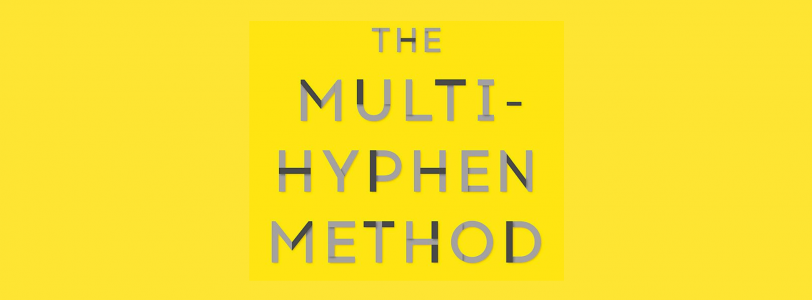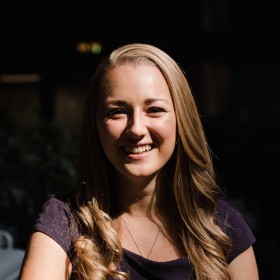The phrase “Jack of all trades, master of none” was first published 400 years ago. Today, it continues to cling to conversations about ‘portfolio careers’ or ‘side hustles,’ undermining the importance and relevance of career made up of more than one company, industry or income stream.
In her latest book, The Multi-Hyphen Method, Emma Gannon reflects on her career as an author-consultant-podcaster, shares stories of other multi-hyphenates and aims to inspire readers to make their career more fulfilling and future-proof.
The term ‘multi-hyphenate’ is one that Emma seeks to redefine and reclaim. It was first coined in the 1970s and is described by OED as “a person, especially a celebrity, with several professions or skills.” Being a multi-hyphenate isn’t just for celebrities. And as the examples in Emma’s book show, we all have unique skills and experiences that have the potential to become professions.
Victoria, a solicitor and head of a social-mobility charity describes how having two roles with different challenges makes her better at both jobs; Ally, a paramedic-blogger-photographer, talks about the fulfilment gained from having more than one job; Adam, a chef-podcast producer, shares the importance of having a creative outlet in producing two podcasts, as well as earning an extra income. The Multi-Hyphen Method isn’t about quitting your job or working endless hours, it’s about encouraging readers to explore and make space for skills and passions that can become projects.
Marketer-podcaster-curator
Before reading this book, I had never heard of the term ‘multi-hyphenate’ but it is one I’ve come to love. In multi-hyphenate terms, I’m a marketer-podcaster-curator. As the Communications and Marketing Executive for Starling Bank, I work with a dynamic team to create and share a banking app that helps people manage their money. I gain huge insight into the world of finance and technology and have a role in which no two days are the same.
My evenings and weekends are filled with the creation of my weekly podcast, The Figure, that I co-host with my friend Georgia Parkin. Each week, we share our thoughts on three figures: a person, a statistic and an image, photograph or painting. Sixteen episodes in, I can’t imagine my life without it. I have learned so much not only about the figures we cover, but about editing, social media, and most importantly the power of conversation and collaboration. I first met Georgia when I was two weeks old - twenty-three years later we’re still growing up together and there is no one I would rather share this project with. She made me see that it was possible (and that cringing at recordings of your voice is normal and that you get over it).
One of my long-term projects is curating an exhibition in Edinburgh of the art of my great-great-uncle John Henry Lorimer, planned for November 2020. This opportunity came from the creation of my online gallery Upward-Onward, which collects and connects the art of my family and was designed as part of my degree at Durham University.
A multi-disciplinary education
For many students, the British education system narrows down subject choices early on, marginalises creative subjects and prioritises league tables over learning. Without fully realising the opportunities it would open up, I chose to make my education more multi-disciplinary - something I have more appreciation for since reading The Multi-Hyphen Method.
At 15, I started the International Baccalaureate, going from ten GCSEs to six IB subjects rather than three or four A-Levels. As a result, I was able to switch my university course from Psychology to Combined Honours in Arts when I changed my mind aged 17.
I wish more university degrees gave students the freedom and choice I had, as they do in Scotland and America. I had no compulsory modules and chose and therefore valued each one. And I ended up with a completely unique degree in terms of the combination of what I studied: History of Art and English Literature plus some Anthropology and Italian.
This kind of education doesn’t suit everyone, but for me studying more subjects at school ultimately meant spending my university years learning about the writers and authors I loved rather than doing one degree I thought would be ‘more employable.’
Looking past the challenges
Having doubts over employability and job security is one of several obstacles to being a multi-hyphenate that Emma explores, along with lack of time and fear of failure. In answer to questions such as ‘Don’t you feel unstable?’ or ‘Don’t you miss your monthly salary?’ Emma tells people that she actually felt more unstable working for a company she thought couldn’t adapt to the digital age and that having multiple streams of income means that she no longer relies on one job going well - she has others to fall back on.
When it comes to managing your time and working in a deeper way, The Multi-Hyphen Method is full of practical advice: checking emails once in the morning, once in the afternoon and putting an out-of-office on in between to explain that you might not reply immediately; reclaiming your lunch hour and using this to work on a project or really switch off to start the afternoon with more energy; making a request for flexible work and putting this in writing with a date, outlining preferred timings.
Fear of failure is something that plagues many of us and it is easy to forget that ‘failures’ often lead to successes. This idea is explored by journalist-podcaster Elizabeth Day in How to Fail, a series of interviews with guests who talk about what they learned and achieved following what may have seemed a ‘failure’ at the time.
Yet even when we know that we learn from past ‘failures,’ fear can stop us from trying so many things, especially when it comes to being creative. As Brené Brown says in her TED talk The Power of Vulnerability, many people remember being told that a painting wasn’t ‘good enough’ or that they would ‘never be any good at writing.’ She uses the term ‘art scars’ to describe these memories that hold us back and shrink our creative confidence.
Recognising these experiences as failures of the education system not of our 7-year-old selves can help us move on and see that we don’t have to live in a world where everyone is boxed in to being a numbers person or an arty person, a science geek or a bookworm.
Looking to the future
As technology progresses, being human can become our strength not our weakness. We don’t have to see artificial intelligence as a threat to future employment, we can see it as an opportunity to create something that technology can’t. Be imaginative, make beautiful mistakes and communicate in a way that only you can. And use technology to amplify this, as a tool that you can play with, learn from and help expand your career.
Being a multi-hyphenate is a movement that we can all be a part of. In the future, “the employer or industry will no longer be the centre of your career - you will be,” says Gwendolyn Parkin, the psychotherapist-consultant who runs Integral Career. Let’s transform that phrase “Jack of all trades, master of none,” into something that celebrates the future of work: “Kings of Queens of their trades, master of many.”







What a great piece! 'Portfolio careers' are more and more the norm, bringing our multi-skilled nature to a whole other level; keeping in touch with many parts of our being. As you say though, this can be fulfilling - if not not mind boggling at times.